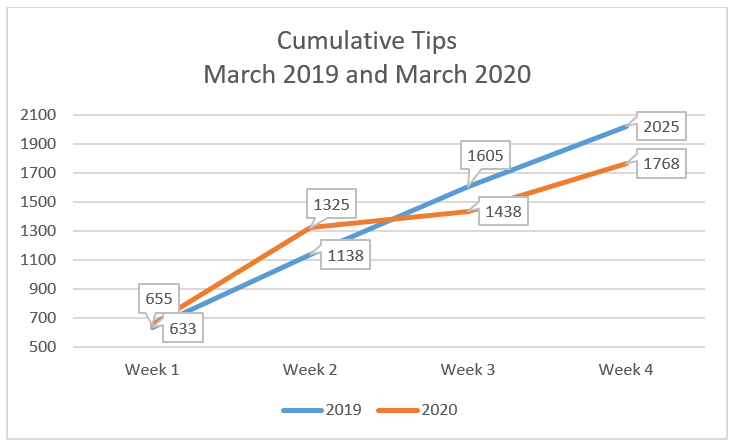Coronavirus public health emergency impacts March Safe2Tell tips
Decrease in tips was anticipated due to schools being closed
April 14, 2020 (DENVER, Colo.)— Safe2Tell tips decreased 13% in March, according to the monthly report released today, but Attorney General Phil Weiser and program Director Essi Ellis encourage students to continue utilizing the tip line from home.
Prior Safe2Tell data reflects a cyclical decrease in tips during times of extended school closures, such as summer vacation and seasonal breaks. The decrease in tips was anticipated due to schools being closed in the wake of current, unprecedented times.
“As we all do our part and take action to protect our friends and family during this public health crisis by maintaining social distancing, we want students to know they can still anonymously report safety concerns to Safe2Tell,” said Weiser. “The decrease in the number of tips we received in March was not unexpected, but the continued use of the program shows its value to our residents even while school buildings are not in use.”
In March, the program received 1,768 tips, a 13% decrease in monthly tip volume compared to March 2019. To date for the 2019-20 school year, Safe2Tell has received 17,775 tips, a 16% increase over the 2018-19 school year.
Suicide threats (377) and drugs (101) continued to be two of the top categories of tips reported to the program, while school complaints (126) rose to replace bullying in the top three tip categories for March.

This graph shows the cumulative number of tips submitted to Safe2Tell in March 2019 and March 2020.
“School complaint” is a general category available for people to choose when submitting their tips. In March, the bulk of school complaint tips were COVID-19 related.
“Safe2Tell never stops taking tips. During these unprecedented times, it is crucial for our youth to remember that they can continue to report safety concerns about themselves, their friends and their community, day or night,” said Ellis. “Our collective, daily routines may be very different than from a month ago, but Safe2Tell remains a constant and stands ready to process tips 24/7, 365 days a year.”
In March, anonymous tips from students and other individuals successfully helped prevent incidents of harassment and illegal activity. For example:
- A Safe2Tell tip was received regarding student harassment. The School Resource Officer investigated and an action plan has been enacted for all parties involved.
- A Safe2Tell tip was received involving drugs. The police investigated and issued a citation.
COVID-19 complaints involving non-critical businesses remaining operational and other types of non-safety related concerns should not be submitted to Safe2Tell. Instead reference the Attorney General’s coronavirus page for further information and ways to submit reports about non-safety related issues.
Safe2Tell is a successful violence intervention and prevention program for students to anonymously report threats to their own, and others’, safety. Safe2Tell is not an emergency response unit nor mental health counseling service provider; it is a conduit of information for distributing anonymous tips to local law enforcement and school officials, according to state law.
To make a report, individuals can call 1-877-542-7233 from anywhere, 24 hours a day, seven days a week. Reports also can be made at Safe2Tell.org or through the Safe2Tell mobile app which is available on the Apple App Store or Google Play.
###
Contact: Lawrence Pacheco
Director of Communications
Mobile: (720) 245-4689
lawrence.pacheco@coag.gov